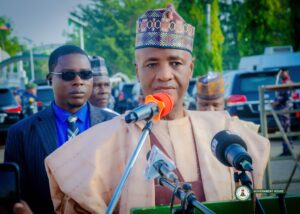
Chidimma Uchegbu
The federal government, through the Tertiary Education Trust Fund (TETFund) has earmarked N70 billion to implement a mini-grid solar power project in some tertiary institutions.
The project was approved by President Bola Tinubu under the 2025 intervention cycle of TETFund.
Speaking at the first town hall meeting convened by TETFund, Chairman of TETFund Board of Trustees, Aminu Bello Masari, said the project will provide renewable and sustainable energy solutions to twelve selected institutions across the country.
The institutions include Nigerian Army University, Biu, Borno State; Northwest University, Kano; Ambrose Alli University, Edo State; Alvan Ikoku University of Education, Owerri, Imo State; and Lagos State University, among others.
He said, “Mr. President is committed to solving the problem of erratic power supply, which remains one of the most critical constraints to teaching, research, and innovation. Therefore, the President approved the implementation of the Mini-Grid Solar Power Project under the 2025 Intervention Cycle, with an allocation of ₦70 billion.
“The project will provide renewable and sustainable energy solutions to twelve (12) selected institutions across the country, in the first instance.”
Executive Secretary of TETFund Sonny Echono revealed that at the beginning of the Tinubu administration, there were fears that the education tax could be reduced from three percent to 2.5 percent, a move that could have crippled tertiary education funding.
He said, “When the Finance Act was reviewed, there was serious concern that the rate would drop. But when it got to Mr. President, he immediately rejected the proposal. That decision alone showed his deep commitment to education.”
He shared a personal account of how he privately met the President to explain that certain provisions in the tax law could result in the termination of TETFund by 2030.
“I told Mr. President, ‘You cannot be the one under whose tenure TETFund ceases to exist.’ He listened, and he acted. That is leadership,” Echono said.
Echono added that President Tinubu later doubled TETFund’s intervention allocations from two percent to four percent, an unprecedented move that, according to him, demonstrated the President’s compassion and faith in education as the foundation of national development.
He also revealed that the President directed TETFund to prioritise student welfare, beginning with the construction of twenty-four Renewed Hope Hostels across the country.
“He said students deserve decent, livable hostels. You cannot put students in deplorable conditions and expect them to behave like well-bred citizens,” Echono said.
The Executive Secretary also confirmed that massive investments were underway to make campuses energy-independent.
“When you talk about Band A or Band B, that is no longer our language. Our universities will soon be energy self-sufficient,” he said.
Echono commended the President’s compassion for young Nigerians, especially through the launch of the student loan scheme.
He added, “Under no condition should any Nigerian child be denied access to education because of their parents’ economic status. That is why today we have one of the most robust student loan schemes in the world. There is no excuse anymore not to go to school.
Secretary to the Government of the Federation (SGF), Senator George Akume, described the Town Hall as a social contract between TETFund and the Nigerian people.
Represented by Mr. Olusegun Adekunle, a retired Permanent Secretary in the Office of the SGF, Akume said: “This Town Hall is an accountability forum. It aligns with the Renewed Hope Agenda and serves to celebrate TETFund’s achievements while identifying its shortcomings.”
According to him, TETFund is not just an intervention agency, but an instrument of national transformation.
He appealed to all stakeholders to continue to support TETFund, saying that collective ownership and constructive feedback were key to sustaining its impact.
The Chairman, Committee of Vice Chancellors of Nigerian Federal Universities (CVCNU), Prof, Tanko Ishaya, commended TETFund for organising the crucial meeting and for ensuring that Nigeria can stand tall when discussing its universities and other tertiary institutions.
Ishaya, who doubles as the Vice-Chancellor, University of Jos, also praised ASUU members for their foresight in establishing TETFund, describing the forum as a strategic platform for dialogue and accountability toward the future of Nigeria’s higher education system.
“Today’s conversation is timely. Our institutions must be empowered to produce cutting-edge research, and I believe this engagement will further strengthen the relationship between the government, industry, and academia,” he said.
Former ASUU President, Prof. Emmanuel Osodeke, expressed deep concern over recent policy changes affecting TETFund, warning that such moves could undermine the purpose for which the agency was created.
Osodeke lamented that about N600 billion remains idle in the Central Bank of Nigeria, representing funds allocated to universities that have not utilised them for approved projects, some lying dormant for over ten years.
He urged TETFund to sanction universities that fail to use or mismanage their allocations, insisting that accountability must cut across both TETFund and beneficiary institutions.
On the Nigerian Education Loan Fund (NELFUND), Osodeke criticised the scheme as ineffective and harmful, alleging that it has already been abused by some universities to justify exorbitant tuition fees.
He said public universities now charge between N2 million and N4 million because students can “borrow” from NELFUND, leaving them indebted up to N40 million upon graduation.
Osodeke called for grants to poor students rather than loans that could push them into lifelong debt.
He further warned against overstretching TETFund to finance responsibilities that properly belong to the government, such as student loans or basic education, emphasising that TETFund is meant to be an intervention agency, not a substitute for regular budgetary funding.
Osodeke also proposed an amendment to the law establishing TETFund, recommending that new universities should exist for at least 5-10 years before qualifying to access TETFund intervention, to curb the proliferation of “constituency universities” created without proper planning or capacity.





Join the Conversation